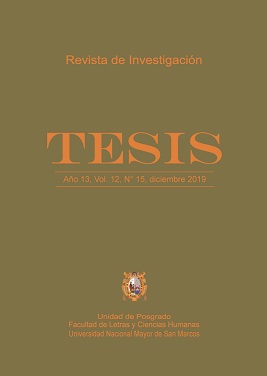El concepto de la muerte en la obra de José María Arguedas y su relación con lo Real Maravilloso
DOI:
https://doi.org/10.15381/tesis.v12i15.18821Keywords:
Death, Real Maravilloso, Rasu Ñiti, Latin AmericaAbstract
The article examines the vision of death proposed in the work of the Peruvian writer José María Arguedas, specifically in the analysis of the story “La agonía de Rasu Ñiti” (1962), and its relationship with the approach to "lo real maravilloso". The structure of the article begs a contextualization of the concept of death from the perspective of the Latin American “real maravilloso”. Following must be a focus on the description of death in the aforementioned story. It should be noted the intention behind proposing the story in question is to demonstrate it as a representative example of the vision of death in Arguedas' narrative. Finally, it is concluded that “La agonía de Rasu Ñiti”, thanks to the perception of death that it exhibits, shows several features that approach Arguedas to “lo Real Maravilloso”.
Downloads
Published
Issue
Section
License
Copyright (c) 2019 Reynaldo Óscar Santa Cruz Cabrera

This work is licensed under a Creative Commons Attribution 4.0 International License.
THE AUTHORS RETAIN THEIR RIGHTS:
(a) The authors retain their trademark and patent rights, and also on any process or procedure described in the article.
(b) The authors retain the right to share, copy, distribute, execute and publicly communicate the article published in Tesis (Lima) (in example, depositing the article in an institutional repository or publish it in a book), with recognition of its initial publication in the Tesis (Lima).
(c) The authors retain the right to make a later publication of their work, to use the article or any part of it (for example: a compilation of their works, notes for conferences, thesis, or for a book), provided that they indicate the source of publication (authors of the work, magazine, volume, number and date).














